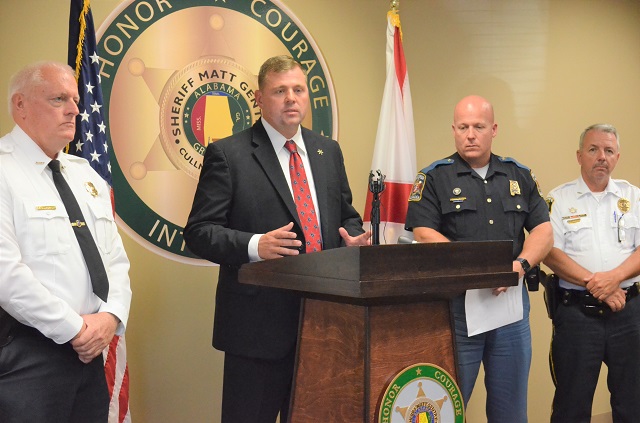
CULLMAN, Ala. – Life has recently become far more difficult for law enforcement officers across the country, as protest groups call for police agencies to be defunded and even dismantled, and political leaders in certain places have supported the movement. Some groups have called for the outright abolition of law enforcement agencies, while others have called for agencies to remain largely intact- though scaled back- while a certain amount of their funding is redistributed to other community entities like mental health and social services.
In Cullman County last week, a new group appeared, calling itself the “Committee for a Better Cullman.” The group, which defines itself as “a collaborative action committee of Democratic Socialists of America – Birmingham and Party for Socialism and Liberation – Birmingham,” says on its Facebook page, “We stand firm on the ideas of anti-racism, police abolition, anti-capitalism and socialism.”
The group is decidedly anti-police, prohibiting its Facebook group members from “police sympathizing,” and saying, “The instituion (sic.) of policing is rooted in, and perpetuates, the systems of white supremacy and capitalism. Our immediate goal is to defund all local police departments. No support of police will be tolerated in this group.”
The group has planned a “Juneteenth” celebration (a historical African-American observance marking the emancipation of the last slaves at the end of the Civil War) for this Saturday afternoon at Veterans Park in Hanceville. A “Back the Blue” rally has been announced for roughly the same time period in front of Billy Bob’s Fireworks Super Store in Good Hope.
As those opposed to law enforcement attempt to gain a foothold in Cullman County, The Tribune talked to Hanceville Police Chief Bob Long, Cullman County Sheriff Matt Gentry and Cullman Police Chief Kenny Culpepper about the ongoing controversy, and got their thoughts on the movement to defund law enforcement agencies.
Chief Long
As he and his department are looking toward the upcoming Juneteenth event in Hanceville, Chief Long shared, “As far as the defunding the police, those people are entitled to their rights, just like you have your right to go to church on Sunday and worship the way you so choose. Law enforcement officers have taken an oath to uphold the law, and we have to make sure that those people have those same rights. Do we have to agree with it? Absolutely not. But we are there to make sure that nobody interferes with their ability to state their own opinion, as long as it is peaceable. They have a right to peaceably assemble.
“Now, with that being said, they do not have the right to tear down buildings, burn buildings, go in and loot and rob your store, to assault people, to throw Molotov cocktails at officers and burn down their squad cars and so forth. That is criminal, and those people need to be arrested and go to jail, and face prosecution.”
Sheriff Gentry
Sheriff Gentry was straightforward in his opposition to the movement, saying, “The ‘Defund the Police’ agenda is being driven by out-of-touch extreme left wing groups that have no idea what it’s like to walk in the shoes of a deputy sheriff or a police officer trying to keep people safe every day and night. If that agenda happens, then you lose the front line of defense between the criminals and the law-abiding citizens. If there is no law, we as a nation will fail.
“I know that the overwhelming vast majority of law enforcement officers are honorable men and women, I have served with many during my 20 years in law enforcement, that go to work every day to make life better for the citizens where they work, and specifically the law enforcement officers here in Cullman County.”
The Cullman County Sheriff’s Office has a reputation for community engagement, bringing deputies and civilians together through programs like the Citizens’ Academy, firearm safety classes, special needs track and field day and special needs mini rodeo, and even cooks for community events at its own expense.
Said Gentry, “We are very proud to live in the greatest community in the state of Alabama. It is important as law enforcement to be engrossed with the community to build relationships and partnerships. If we, as law enforcement, work with a community, then it brings strength and stability for a community.”
Of police defunding, he added, “I can’t imagine this movement would ever gain traction in Alabama or Cullman County. We will continue to make sure Cullman County is the safest county to live in and continue to have the best and most qualified deputies at the Cullman County Sheriff’s Office.”
The sheriff has spoken many times about the dangers of forcing law enforcement to be the front line of mental health crisis services, but he was not prepared to offer an endorsement of sharing sheriff’s office funds, saying, “I would have to see what they do with the money, really, first.”
Chief Culpepper
Chief Culpepper took a measured look at both sides of the issue, but cautioned, “Well, you know, when you say ‘defunding’ or ‘police reform,’ those are broad categories and the details are what’s important. What is the specific plan?
“Just from my perspective, you know, I’ve been in law enforcement 42 years, and over that time span, I’ve seen more and more be given to the police to do because the other agencies that should be doing it haven’t been funded properly. Mental health is a real good example; the mental health system has not been funded properly. Well, it falls to the police to handle it in a lot of cases when they get pushed back into the community, they go off their medication and we have to deal with it, at least initially.
“The biggest facility that houses the mentally ill in the state of Alabama is the prison system, the jail system, the law enforcement system, criminal justice system. So that has basically been given to law enforcement to handle, because mental health has not been properly funded.
“Drug abuse, the drug problem: we become the de facto caretakers for the people who have those issues, because we get called to the scene. You can say the same thing for domestic violence and just on and on and on. These issues where the agencies have not been funded to be able to respond to them, and so it’s given to the police. The reason is because it’s cheaper to do it that way, and we don’t want to fund it. The police can do it cheaper, because, you know, ‘Let’s just let the police handle it.’
“So if you told me that you were going to properly fund all of those different agencies- social workers and mental health experts and drug addiction experts- to go in and take care of these problems, I would be for it, and every police officer I know would be for it, and we would be willing to give up some of our budget to do that. The problem is we’re doing it on the cheap, we’re handling these problems on the cheap, so to speak, because they kind of fell to us, and you’re never going to be able to make enough money off of our budget to properly fund that. They need to be funded separately.”
A jack of all trades: recruiting and training capable police officers
“As law enforcement officers today, we’ve actually been forced to wear many hats,” said Long. “We’re law enforcement officers, a referee, a marriage counselor, social worker, dog catcher, numerous things. The public expects us to be able to handle all those situations, and I think, by and large, for the most part, most officers do a pretty good job.”
Culpepper talked about how police officers deal with so many issues today that, historically, were not part of their regular jobs, saying, “It’s a constant learning process. You know, I teach at the police academy, and have done so for 30-something years, and one of the things that I tell the officers is that you have to be a jack of all trades, because when you go out on that call, it may be an autistic person that you’re dealing with- an autistic child or an autistic young person. ‘Well, do you know the difference? How do you respond to that?’ You need training in that. Or is it someone who’s intoxicated, or is it someone who’s having a diabetic incident? There’s so many different variables in what you’re having to deal with day to day, that you’re having to make judgment calls on.
“You try to get as much training for everybody as you can, for all the different situations, but it’s impossible because there’s so many different variables. I think that’s one reason that you’ve got, when you recruit, you want to try to recruit people who have a lot of common sense and who can kind of figure things out, because it’s not always going to be cut and dried, in the book where it says, ‘This is what you’ve got to do,’ because the situation is always going to have some variables and some flexibility built into it. You need good people. That’s the bottom line.”
Copyright 2020 Humble Roots, LLC. All Rights Reserved.




















